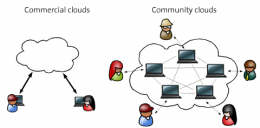Customised computing clouds on the horizon

Cloud services currently on the market do not provide sufficient security. According to one Norwegian research scientist, users are better off forming cloud computing ties among their circle of friends, family, town or municipality.
Together with colleagues at the Northern Research Institute (Norut) in Tromsø, Marte K. Skadsem has developed software suitable for creating community clouds of this type.
Easy peasy, except...
“Cloud computing has become a trendy phrase, but it is essentially just a new label for something we’ve been working on for a long time. The principle behind a cloud is the distribution of data resources over several servers connected in a network,” Ms. Skadsem explains.
Typically, cloud computing primarily involves such services as email and file-storage and sharing – for example, storing and sharing digital photos. With Internet access to these services, users need not concern themselves with the underlying system as long as everything works as prescribed.
Commercial clouds are inexpensive and simple to use. They allow users to access their data from anywhere. Google, Microsoft and Amazon are among the companies providing cloud solutions. However, handing over data to a commercial cloud system also entails losing some control over it.
“When using this type of service, you store your data on servers without knowing where they are located. If they are situated on foreign soil, they are subject to the laws of that country,” warns Ms. Skadsem.
A preference for community clouds
“Should a supplier of cloud services go bankrupt, the question remains open as to whom the stored data actually belongs and what is to become it. There are already examples showing how easily data retrieval can end up being problematic. It can also end up being difficult to move your data if you choose to change suppliers,” Ms. Skadsem points out.
“You should actually assume that by storing data in commercial clouds you are making it accessible to anyone. This means you should not be storing any information there that you don’t wish to have disclosed to the public – just like you wouldn’t write sensitive information on a postcard.”

Ms Skadsem, a doctoral fellow, is associated with the Decentralized Storage of Multimodal User Data (DeStore) project, which receives funding from the Research Council's Large-scale programme Core Competence and Value Creation in ICT (VERDIKT). Based on the results from this project, she recommends using community clouds over large commercial solutions.
The members of a community cloud store backup copies of each other’s data locally and share data amongst themselves. This, according to Ms Skadsem, ensures tighter security and greater personal protection.
Collective efforts and the common good
Community cloud members make both personal network capacity and data resources available. Data is distributed among members’ machines, thus forming a peer-to-peer (P2P) network. The more machines there are online at one time, the greater network capacity there is available to the members.
In order for this type of solution to succeed, clear usage guidelines must be established. For example, some users must agree to keep their machines up and running at all times. And anyone choosing to make use of shared resources without contributing their own may risk being expelled from the group.
Ms. Skadsem likens the concept of a community cloud with the spirit of the Norwegian dugnad – a collective effort.
“We take part in dugnads in order to achieve a common goal. Be it spring cleaning of the grounds of your apartment complex together with neighbours or painting the day-care centre where your youngest child spends weekdays, participants contribute according to their ability and, in turn, benefit from the contributions of everyone involved.”
“A sense of fellowship and trust is also a prerequisite for a community cloud to work,” explains Ms. Skadsem. “The photos and documents you store in the cloud will reside on other members’ computers. You need to trust that the owners of these machines won’t attempt to access your data illicitly.”
Smarter data processing
One of the challenges to setting up a good community cloud is the fact that some members may have little bandwidth and substandard processing and storage capacity. In such an instance, attempting to transfer photos via the cloud from a stationary PC to a wirelessly-connected laptop could be tediously slow.
Ms. Skadsem and her colleagues are designing a system to solve this problem. The system is structured so that, for example, it is not original photos that are transferred. Instead, the photos transferred come from the larger-capacity stationary PC after they have been converted into lower quality files. This becomes even more significant when attempting to transfer photos to a mobile phone, which has even less capacity.
From professional to home version
Norut’s software, DeStore, and programming interface, DeLight, used to set up community clouds are currently accessible to experts only.
“Our goal is to develop a program that individuals can use to set up such computing clouds easily on their own,” says Ms. Skadsem.
Senior Research Scientist Ellen Brox of Norut has headed the DeStore project. International project partners are Delft University of Technology and Lancaster University, both of which have expertise in P2P networking.
Provided by The Research Council of Norway


















